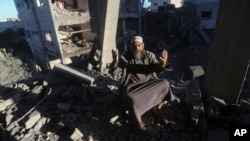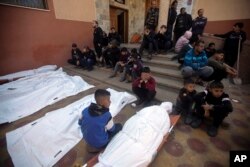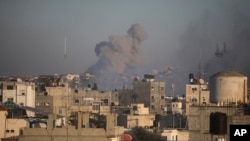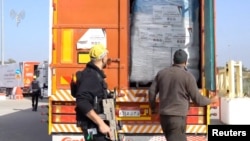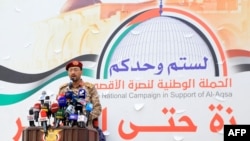Washington is urging Israel to use more precise targeting of Hamas leaders in Gaza, rather than widespread bombing and ground operations, White House national security adviser Jake Sullivan said Friday.
"There will be a transition to another phase of this war, one that is focused in more precise ways on targeting the leadership and on intelligence-driven operations," he told reporters during a visit to Israel.
"When exactly that happens and under exactly what conditions will be a continuing intensive discussion between the United States and Israel," Sullivan said. "The conditions and the timing for that was obviously a subject of conversation I had" with Prime Minister Benjamin Netanyahu, other Israeli government leaders and military commanders.
At the same time, the Israeli military reported it mistakenly killed three Israeli hostages during its ground operation in the Gaza Strip. The army's chief spokesman, Rear Admiral Daniel Hagari, said Israeli troops found the hostages Friday and erroneously identified them as a threat.
He said it was not clear if they had escaped their captors or been abandoned. Their deaths occurred in the Gaza City area of Shijaiyah, the scene of bloody battles against Hamas militants. He said the army expressed "deep sorrow" and is investigating.
Israeli defense chief Yoav Gallant told Sullivan on Thursday it will take "more than several months" to destroy Hamas, which he said has been building its infrastructure “under the ground and above the ground" in Gaza for more than a decade.
"But we will win, and we will destroy them," Gallant said.
Sullivan declined to answer when asked Friday whether the U.S. would hold back military aid if Israel does not reduce civilian casualties, saying the best way to reach an agreement was in private discussions.
Sullivan also said after meeting with Netanyahu and Gallant in Tel Aviv that Israel's efforts to crush Hamas must not lead to a long-term Israeli occupation of the territory. He said the United States believes it neither makes sense nor is right for Israel to reoccupy Gaza over the long term.
So far, the Israel Defense Forces have resisted increasing global pressure to curb its Gaza offensive.
The Middle East has been a tinderbox since Iranian-backed Hamas launched a terrorist attack on Israel on October 7, killing at least 1,200 people while taking about 240 people hostage, by Israeli count. Israel's retaliatory strikes and ground offensive have killed more than 18,000 Palestinians, a large percentage of them women and children, according to the Hamas-run Gaza Health Ministry.
West Bank violence
Twelve European nations joined by Australia, Canada and the European Union have called on Israel "to take immediate and concrete steps to tackle record high settler violence in the occupied West Bank."
In a joint statement released Friday by the Swedish government, the countries expressed "their grave concern about the record number of attacks by extremist settlers against Palestinians in the West Bank."
"The rise in extremist settler violence committed against Palestinians is unacceptable," the statement said. "Israel, as the occupying power, must protect the Palestinian civilian population in the West Bank."
The joint statement also said that "those responsible for the violence must be brought to justice" and that the violence "undermines security in the West Bank and the region and threatens prospects for a lasting peace."
The European countries are Belgium, Denmark, Finland, France, Ireland, Luxemburg, the Netherlands, Norway, Spain, Sweden, Switzerland and the United Kingdom.
Fierce fighting
Fighting in Gaza between Israeli forces and Hamas raged on Friday. The Israeli military said its troops had destroyed a Hamas command-and-control hub in Gaza's Sheijaia district and conducted a "targeted raid" on militant infrastructure in Khan Younis.
The Israel Defense Forces also said its soldiers have recovered the bodies of two soldiers and one civilian hostage taken in the Hamas terror attack on October 7.
Urban warfare in Gaza is also proving deadly for the Israeli troops. About 110 Israeli soldiers have been killed as tanks and infantry advance into the cities and refugee camps, based on official Israeli figures. About a quarter were tank crew.
According to Israeli military experts and a Hamas source, Hamas, a U.S.- and EU-designated terrorist group, has used a large weapons stockpile, its knowledge of the terrain and a vast tunnel network to turn Gaza's streets into a deadly maze.
At their disposal they have arms ranging from drones rigged with grenades to anti-tank weapons with powerful twin charges.
WHO aid
The World Health Organization welcomed the opening Friday of the Kerem Shalom crossing into Gaza but said more needed to be done to ensure that essential medical supplies reached hospitals in dire need across the enclave.
Speaking to reporters in Geneva via video link, Dr. Richard Peeperkorn, WHO representative in Gaza, described the opening as "good news" but said there were hospitals that were difficult to reach in the north of the enclave that still need essential medical supplies.
"How can we make sure that these [aid] trucks can go everywhere in Gaza, not just to the south but also to the north?" Peeperkorn asked.
Israel approved the entry of 200 trucks of aid into the Gaza Strip through the Kerem Shalom crossing.
Meanwhile, the U.N. Humanitarian Office said Friday tens of thousands of homeless Gazans who have crammed into Rafah since December 3 are struggling in extremely overcrowded and unsanitary conditions, raising concerns about the spread of disease.
While reiterating U.S. support for Israel and its military response to the deadly Hamas attack against Israel two months ago, U.S. President Joe Biden and other officials have expressed concern about the number of civilian casualties in the Gaza Strip.
"Our support for Israel is not diminished," White House National Security Council spokesman John Kirby said, "but we have had concerns, and we have expressed those concerns about the prosecution of this military campaign, even while acknowledging that it's Hamas that started this, and it's Hamas that is continuing it."
Israel has defended its tactics, saying it is taking unprecedented steps to minimize civilian casualties, such as ordering people to evacuate areas where it plans to carry out military operations.
Israel's military also has blamed Hamas for intentionally operating in populated areas.
The U.N. Palestinian refugee agency says nearly 1.9 million people, about 85% of Gaza's population, have been forced from their homes, with more than 1.1 million currently registered at the agency's shelters in central and southern Gaza. The agency said the average shelter is nine times over its intended capacity.
After returning from a trip to Gaza on Thursday, World Food Program Deputy Executive Director Carl Skau told reporters at the United Nations in New York that the situation among civilians is "increasingly desperate and chaotic."
"The grim reality is also that nine out of 10 people are not eating enough, or not eating every day, and don't know where their next meal is going to come from," he said, adding that no WFP food assistance has reached the north of Gaza since a weeklong cease-fire ended December 1.
Shipping targets
Attacks on commercial vessels have been surging in the Red Sea since the Israel-Hamas war broke out two months ago.
The German government strongly condemned attacks on ships from Houthi-controlled Yemen, German Foreign Minister Annalena Baerbock said Friday and added that she thanked Saudi Arabia for helping thwart similar attacks by shooting down drones and missiles.
"The Houthi attacks on merchant ships in the Red Sea must stop immediately," Baerbock said during a news conference in Berlin alongside her Lebanese counterpart, Abdallah Bou Habib, when asked about the attack on a vessel owned by German shipping company Hapag-Lloyd.
The German container shipping line is mulling whether to pause sailings through the Red Sea, hours after reporting one of its ships was attacked near Yemen, a spokesperson said Friday.
Also, Danish shipping company A.P. Moller-Maersk will pause all container shipments through the Red Sea until further notice and send them instead around Africa, a spokesperson for the company told Reuters on Friday.
The company's vessel Maersk Gibraltar was targeted by a missile while traveling from Salalah, Oman, to Jeddah, Saudi Arabia. The crew and vessel were reported to be unharmed, the company said Thursday.
VOA White House Correspondent Anita Powell contributed to this report. Some information for this story came from The Associated Press, Agence France-Presse and Reuters.




